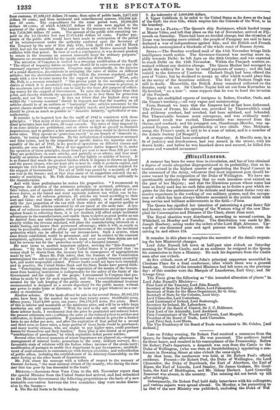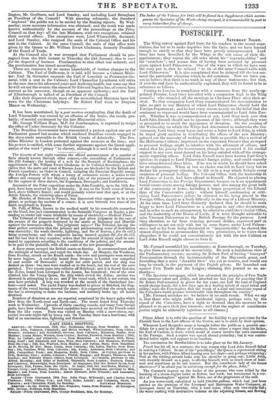Airtistellautous.
A rumour has been for some time in circulation, and has of late obtained a degree of credit altogether disproportioned to its probability, that an in- tention existed in the highest quarter of appointing the Royal Consort to the command of the Army, whenever that most important post should be- come vacant by the resignation of the Duke of Wellington. We have un- questionable authority for stating that no such intention ever existed on the part of her Majesty; and that the illustrious person whose name has been so freely used has no such false ambition as to desire a post which re- quires for the due performance of its delicate and important duties very ex- tensive experience in the working of our military system, and the occupa- tion of which has been always hitherto associated in the public mind with long service and brilliant achievements in the field.—Times.
The Queen has signified her intention of patronizing a great fancy fair and bazaar, to celebrate the opening of the Western wing of the new Hos- pital for Consumption and Diseases of the Chest, about June next.
The Royal charities were distributed, according to annual custom, in Whitehall, on Monday and Tuesday. The distribution was made by Mr: Joseph Hanbury, acting under the orders of the Lord High Almoner. Up- wards of one thousand poor and aged persons were relieved, some re- ceiving Si. and others 138.
It remains in this place to complete the narrative of the details respect- ing the late Ministerial changes.
Lord John Russell left town at half-past nine o'clock on Saturday morning for Windsor Castle; and at an audience he resigned to the Queen his commission to form a Ministry. He took his departure from the Castle soon after one o'clock.
At five o'clock, most of Lord John's principal supporters assembled in.
Chesham Place for a final conference; after which there was a general break-up. Several of the intended Ministers had left town on the previous day: of this number were the Marquis of Lansdowne, Earl Grey, and Sir George Grey.
The Times gives the following as "the intended allocation of places" in.
Lord John Russell's Ministry—
First Lord of the Treasury, Lord John Russell.
Secretary of State for Foreign Affairs, Lord Palmerston.
Secretary of State for the Home Department, Sir G. Grey. Secretary of State for the Colonies, Lord Grey. Lord Chancellor, Lord Cuttenham. Lord Lieutenant of Ireland, Lord Beaborough. Secretary for Ireland, Mr. Labonchere. President of the Board of Control, Sir J. C. Hobhouse. First Lord of the Admiralty, Lord Auckland. First Commissioner of the Woods and Forests, Lord Morpeth.
President of the Board of Trade, Lord Clarendon. Lord Privy Seal, Lord Minto.
The Vice Presidency of the Board of Trade was tendered to Mr. Cobden, [and
declined.]
Late on Friday evening, Sir Robert Peel received a summons from the Queen, for Saturday afternoon. He was punctual. The audience lasted for three hours, and resulted in his rearceptance of the Premiership. Before Sir Robert Peel's departure, a despatch was sent from the Castle to the Duke of Wellington, (who was then at Strathfieldsaye,) appointing a con- ference in Downing Street at nine o'clock the same night.
At that hour, the conference was held, at Sir Robert Peel's official residence. Present—Sir Robert Peel, the Duke of Wellington, the Lord Chancellor, the Duke of Buccleuch, the Earl of Aberdeen the Earl of Ripon, the Earl of Lincoln, Lord Stanley, Sir James Graham, Mr. Goul- burn, the Earl of Haddington, and Mr. Sidney Herbert. Lord Granville Somerset was absent, in the country. The meeting did not break up till after midnight.
Subsequently, Sir Robert Peel held daily interviews with his colleagnes; and various reports were spread abroad. On Monday, a list purporting to be that of the new Ministry was published, excluding the Duke of Wel
lington, Mr. Goulburn, and Lord Stanley, and including Lord Brougham as President of the Council! With amusing solemnity, the Standard " implored " the public not to be misled by the floating reports. By Wed- nesday, more accurate information was obtained; and the truth was made known authentically by the account of the proceedings at the Privy Council on that day: all the late Ministers, with two exceptions, retained their several offices. The exceptions were, Lord Wharncliffe, deceased; and Lord Stanley, who resigned the seals of the Colonial Office and his seat in the Cabinet. At the same Council, the seals of that office were .given_by the Queen to Mr. William Ewart Gladstone, formerly President of the Board of Trade.
At the Council also it was arranged that Parliament should be pro- rogued from the 30th instant to Thursday the 22d January, then to meet for the despatch of business. Proclamation to that effect was ordered; and the proclamation has issued accordingly.
There are rumours, by no means improbable, of further changes in the Cabinet. The Earl of Dalhousie, it is said, will become a Cabinet Minis- ter; Earl St. Germains succeeds the Earl of Lonsdale as Postmaster-Ge- neral, with a seat in the Cabinet; Lord Chancellor Lyndhurst will retire to the ease due to his advanced years and declining health, but some say that he will set out the session; the nameof Sir Edward Sugden has, of course, been 4urrent as his successor, though on no apparent authority; and the Earl
o f Ellenborough is talked of as President of the Council.
Like their dispersed rivals, most of the reestablished Ministers have left town for the Christmas holydays. Sir Robert Peel went to Drayton Manor on Wednesday.
It has been ascertained, by a post 7110116112, examination, that the death of Lord Wharneliffe was caused by an effusion of the brain; the result, pro- bably, of mental excitement by the late Ministerial crisis.
Mr. George William Hope, M.P. for Southampton, is expected to resign the office of Under-Secretary for the Colonies.
The Brazilian Government have transmitted a protest against our act of Parliament passed last session which rendered Brazilian vessels engaged in the slave-trade amenable to the British Courts of Admiralty. The Bra- zilian Minister in London protested against the measure at the time; and his protest is ratified, with some further arguments against the literal appli- cation of the word " piracy " to slavery, although it is used in the treaty.
The Gazette of last night contains the official announcement of a number of facts already known through other sources,—the assembling of Parliament on the 22d January; the issuing of a writ for the Borough of Buckingham; the appointment of Mr. William Ewart Gladstone to be Colonial Secretary; a notifi- cation that the ports and coast of Buenos Ayres are blockaded by the British and French squadrons; an Order in Council, including the Peruvian Republic among the Foreign Powers with whom a treaty of commerce exists; a notice to the -officers and company of her Majesty's ship Lily, of the payment of prize-money for the capture of three slavers, the Esperanza, Desengaiio, and Confidencia.
Accounts of the Polar expedition under Sir John Franklin, up to the 16th Au- gust, have been received by the Admiralty. It was on the North coast of Green- land, above Gilbert's Sound; and would Probably winter near that spot, or at the Arctic Islands, the wintering-place of Parry. Mr. Hencke, of Driessen in Prussia, has discovered what appears to be a new planet, or perhaps the nucleus of a comet: it is seen between two stars of the ninth magnitude in Taurus.
Dr. Poi, of Milan, known to the medical world by his remarkable researches on the blood, has just communicated to the Scientific Congress at Naples, a pro- aseeding to render salt water drinkable by means of electricity.—Medical Times. The Tribunal of Commerce of Rouen has just given judgment in the case of the owners of the property destroyed by the storm at Idalannay and Monville against the insurance-offices. The judgment says—" The Tribunal, having the most perfect conviction that the primary and predominating cause of destruction was electricity; the words electrity, lightning, and fire of heaven, (feu dis del,) being synonymous; and the companies having insured against the feu du ciel, and the loss that it may occasion; orders that the amount of injury shall be esti- -mated by- appraisers according to the conditions of the policies, and the amount to be paid to the plaintiffs, with all the costs of the law proceedings."
A fierce storm ravaged the British coasts on Sunday. It commenced soon after the midnight of Saturday, and raged the whole day. At Margate, the Woodman, from Bombay, struck on the Knock sands: the crew and passengers were rescued by some luggers. A coal-ship bound from Swansea to London was compelled to cast anchor off Bowcastle : at night her cable parted, and the ship was -dashed on shore: two men were washed on to the beach, but the rest of the crew perished. Two vessels came into collision off Holyhead; and it is feared that one, the lEolus, bound from Liverpool to the Azores, has foundered: two of the crew climbed into the Young Queen, the ship which struck the )Eolus; another was drowned in attempting to do so; and if the vessel sank, which is not certain, ten men have perished. A brig was wrecked at the mouth of the Sunderland har- bour—crew saved. The yacht Fanny was dashed to pieces at Bideford, the frag- ments of the vessel having strewed the shore: it is supposed that she struck upon the bar in attempting to make the harbour, and instantly broke up; all hands .drowned.
Numbers of disasters at sea are reported, occasioned by the heavy gales which blew from the North-west and North-east. The storm lasted from Thursday week to Wednesday. Upwards of thirty coasting vessels, and many from foreign ports, have been wrecked. Several casualties have occurred on the French coast from the like cause. Paris was visited on Monday with a snow-storm, suc- ceeded towards night-fall by heavy rain. On Tuesday there was a hurricane, with bail of an uncommon size, lightning and thunder.





























 Previous page
Previous page